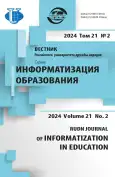Развитие цифровой компетентности преподавателей и педагогических работников вузов
- Авторы: Эльтемеров А.А.1
-
Учреждения:
- Академия государственной противопожарной службы МЧС России
- Выпуск: Том 21, № 2 (2024)
- Страницы: 157-168
- Раздел: ГОТОВНОСТЬ ПЕДАГОГОВ К ИНФОРМАТИЗАЦИИ
- URL: https://journal-vniispk.ru/2312-8631/article/view/321364
- DOI: https://doi.org/10.22363/2312-8631-2024-21-2-157-168
- EDN: https://elibrary.ru/IPKALX
- ID: 321364
Цитировать
Полный текст
Аннотация
Постановка проблемы. В настоящее время цифровые технологии являются неотъемлемой частью всех социальных институтов. Такая глобальная цифровизация среды жизнедеятельности человека изменяет саму парадигму мышления нового поколения. Современному преподавателю необходимо соответствовать новым запросам социокультурной среды. Это определяет актуальность выработки научно-обоснованных моделей формирования и оценки уровня цифровой компетентности преподавателей. Методология . Основным методом выбран анализ результатов опроса преподавателей вузов России о проблеме цифровой компетентности представителей профессорско-преподавательского состава и иных работников (сотрудников) вузов. Проведен библиометрический анализ открытых источников по теме формирования цифровых компетенций преподавателей вузов и мониторинг научных публикаций по ключевым словам «цифровизация», «цифровые технологии», «цифровая компетентность преподавателя». Результаты . В исследовании отображены результаты опроса о наличии некомпетентных представителей из числа профессорско-преподавательского состава и из числа иных работников (сотрудников) отделов вузов России, а также результаты опроса о соответствии уровня материально-технического оснащения вузов запросам современного цифрового общества. Предложена модель оценивания уровня цифровой компетентности педагогических работников вузов. Заключение . В процессе исследовательской работы утверждена необходимость проектирования процесса формирования цифровой компетентности прежде всего профессорско-преподавательского состава, а также иных работников отделов вузов. Для решения исследуемой проблемы предлагается структурирование модели цифровой подготовки по категориям и определение уровня необходимой цифровой компетентности для каждой категории.
Об авторах
Аксар Альбертович Эльтемеров
Академия государственной противопожарной службы МЧС России
Автор, ответственный за переписку.
Email: aksarus@mail.ru
ORCID iD: 0000-0001-7839-5039
SPIN-код: 2996-9662
старший преподаватель
Российская Федерация, 129366, Москва, ул. Бориса Галушкина, д. 4Список литературы
- Sanko AM. Learning tools in the context of digitalization of education. Samara: Samara National Research University named after Academician S.P. Korolev; 2020. (In Russ.)
- Vyazemsky EE. The modern era as a period of fundamental changes in the field of general and higher pedagogical education // School Technologies. 2022;(3):15‒21. (In Russ.) http://doi.org/10.52422/22202641_2022_3_15
- Gerchikova TYa, Degtyarev NI, Kirilenko VV. Development of digital competencies of personnel. Labor Economics. 2021;8(6):585‒600. (In Russ.) http://doi.org/10.18334/et.8.6.112185
- Grinshkun VV. Directions and features of the influence of digital technologies on the development of didactics. Modern “Digital” Didactics. Moscow: GreenPrint; 2022. p. 71‒94. (In Russ.)
- Soboleva EV, Suvorova TN, Podnavoznova EO, Fakova MO. Formation of digital literacy of future teachers using cloud technologies. Perspectives of Science and Education. 2021;(6):505‒520. (In Russ.) http://doi.org/10.32744/pse.2021.6.34
- Fadeeva OA. To the problem of pedagogical teaching staff in the field of modern digital technologies. Informatization of Education and e-Learning Methodology: Digital Technologies in Education: Proceedings of the IV International Scientific Conference, Krasnoyarsk, October 6–9, 2020. Krasnoyarsk: Siberian Federal University; 2020. p. 214‒218.
- Fedorova SN. Updating the main professional educational program of higher education for training personnel in the digital economy. Priority Directions of Psychological and Pedagogical Activity in the Modern Educational Environment: Collection of Materials of the All-Russian Scientific and Practical Conference, Yoshkar-Ola, October 21, 2021. Yoshkar-Ola: Mari State University; 2021. p. 73‒80. (In Russ.)
- Eltemerov AA, Kornilova NA. Incoming control of digital competence of young university teachers. School of the Future. 2023;(5):126‒137. (In Russ.) http://doi.org/10.55090/19964552_2023_5_126_137
- Batova MM. Formation of digital competencies in the system “education – science – production”. Issues of Innovative Economics. 2019;9(4):1573‒1584. (In Russ.) http://doi.org/10.18334/vinec.9.4.41467
- Dneprovskaya NV. Assessing the readiness of Russian higher education for the digital economy. Statistics and Economics. 2018;15(4):16‒28. (In Russ.) http://doi.org/10.21686/2500-3925-2018-4-16-28
- Levitsky ML, Grinshkun VV, Zaslavskaya OYu. Trends and features of the modern stage of informatization of higher education. RUDN Journal of Informatization in Education. 2022;19(4):285‒299. (In Russ.) http://doi.org/10.22363/2312-8631-2022-19-4-285-299
- Vesna EB, Kirichenko AV. Modern technologies for monitoring the information and legal environment. In: Sochivko DV. (ed) Psychology of the 21st Century: Challenges, Searches, Development Vectors: Collection of Materials of the All-Russian Symposium of Psychologists, Ryazan, April 5, 2019. Ryazan: Academy of Law and Management of the Federal Penitentiary Service; 2019. p. 568‒574. (In Russ.)
- Aimaletdinov TA, Baymuratova LR, Zaitseva OA, Imaeva GR, Spiridonova LV. Digital literacy of Russian teachers. Readiness to use digital technologies in the educational process. M.: NAFI Publ.; 2019. (In Russ.)
- Zeer EF, Lomovtseva NV, Tretyakova VS. Readiness of university teachers for online education: digital competence, research experience. Pedagogical Education in Russia. 2020;(3):26‒39. (In Russ.) http://doi.org/10.26170/po20-03-03
- Masalova YuA. Digital competence of teachers of Russian universities. University Management: Practice and Analysis. 2021;25(3):33‒44. (In Russ.) http://doi.org/10.15826/umpa.2021.03.025
Дополнительные файлы









